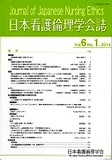Japanese
English
- 販売していません
- Abstract 文献概要
- 参考文献 Reference
1 .はじめに
いま、新たな健康上の問題が生じる一方で、国内・国家間の双方でなお続いているのが健康の格差と不平等という難問である。この観点から、ランセットコミッションズ(The Lancet Commissions)は、21世紀に向けた医療専門職者の教育についてシステムに基づく教育改革を呼びかけている。そこには、すべての国のすべての医療専門職者は、自国民の声に応えつつグローバルにも繋がり、世界チームの一員として患者や住民中心の医療システムに関与していくことができるように、知を結集し批判的推論や倫理的行為をするよう教育されるべきであるというビジョンがある。そのために、新しいプロフェッショナリズムは、医療専門職者を能力で分類する客観的基準を明確に打ち出し、社会的説明責任(ソーシャル・アカウンタビリティ)を核とした医療職に共通の価値体系の開発を推し進めるべきだと述べている(ランセットコミッションズ,2010, p.1924)。本稿で私は、医療専門職がその社会的説明責任を果たすために、チーム医療における協働と連携の努力が求められることに加えて、エンパワーメントの価値を採用する必要性を申し述べたい。この提案は、それぞれ卓越した医療専門職者としての価値観に立脚した自律した実践と自己規制を専門職連携の文脈で見直し、新たな価値体系をチーム実践に組み込む必要があることを意味する。こうした背景から、重度の精神疾患を持つ人々の12ヶ月間にわたる回復過程に沿って追跡した実証研究の知見を詳しく紹介しつつ、複雑な健康問題と共に生きる人々へプラスの成果をもたらすために力を尽くすことができる新しいプロフェッショナリズムの価値体系とは何かを検討する。
Introduction
In view of the gaps and inequities in health persist both within and between countries together with new health challenges in contemporary era, The Lancet Commissions on Education of Health Professionals for the 21st century calls for a systems based education reform, with a vision that all health professionals in all countries should be educated to mobilize knowledge and to engage in critical reasoning and ethical conduct so that they are competent to participate in patient and population-centred health systems as members of locally responsive and globally connected teams. To this end, a new professionalism should be promoted that uses competencies as objective criteria for classification of health professionals and that develops a common set of values around social accountability (The Lancet Commissions 2010, p.1924).In this paper, I would propose that we need to embrace the values of empowerment as well as collaboration and partnership for preparing socially accountable health professionals. This implies that the predominant professionalism grounded in the values of autonomous practice and professional self-regulation has to incorporate new values of inter-professional collaborations. Against this background, this paper will draw on the findings of an empirical study which explicates the recovery journeys of individuals with severe mental illness (SMI), and discuss how the values of new professionalism can be realized so that people who are living with complex health problems can engage in a recovery process with positive health outcomes.
Copyright © 2014, The Japan Nursing Ethics Associatin. All rights reserved.


